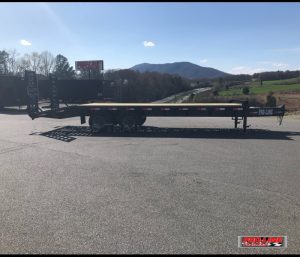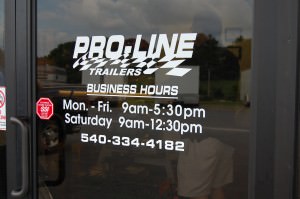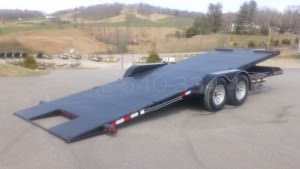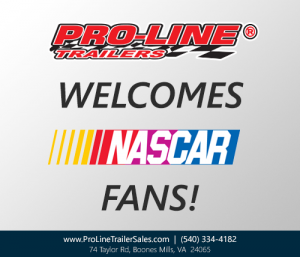Things to Know Before Purchasing a Trailer
Purchasing a trailer can be a big investment. Certainly doing your homework ahead of your purchase can really make the difference in finding the right trailer for the right price, that can fit your needs. But, many purchases are made without looking at the entire towing package. Proline Trailers knows a thing or two about trailers and towing and would like to share some tips on making sure you make the right purchase.
What You Should Consider Before Buying Your Trailer
There are many questions that you are probably asking about your trailer before you buy. Most likely, these questions are about how the trailer will provide the solution to your needs. For example, if you are looking at a sleeper trailer with car transport capabilities to use on the racing circuit, then your questions will differ from those of someone just looking for a horse trailer.
Each need has a specific answer, and only you can know for sure how a trailer will meet those needs.
What is the Purpose of the Trailer?
A good question you should start with is, “What is the purpose for my trailer?”
This will help narrow down the search list that is available. By eliminating trailers that don’t fit your scope of need, you can better focus on finding your ideal trailer. Do you need to haul cargo or are you needing to tow a support trailer for work purposes?
Types of Trailers
- Enclosed
- Open
- Motorcycle
- Race Car
- Sport Vehicle transport
- Landscaping
- Vending
- Living Quarters trailers
- Stackers
- Gooseneck
- Flatbed
- Tilt
- Skid Steer
- Equipment
- Utility
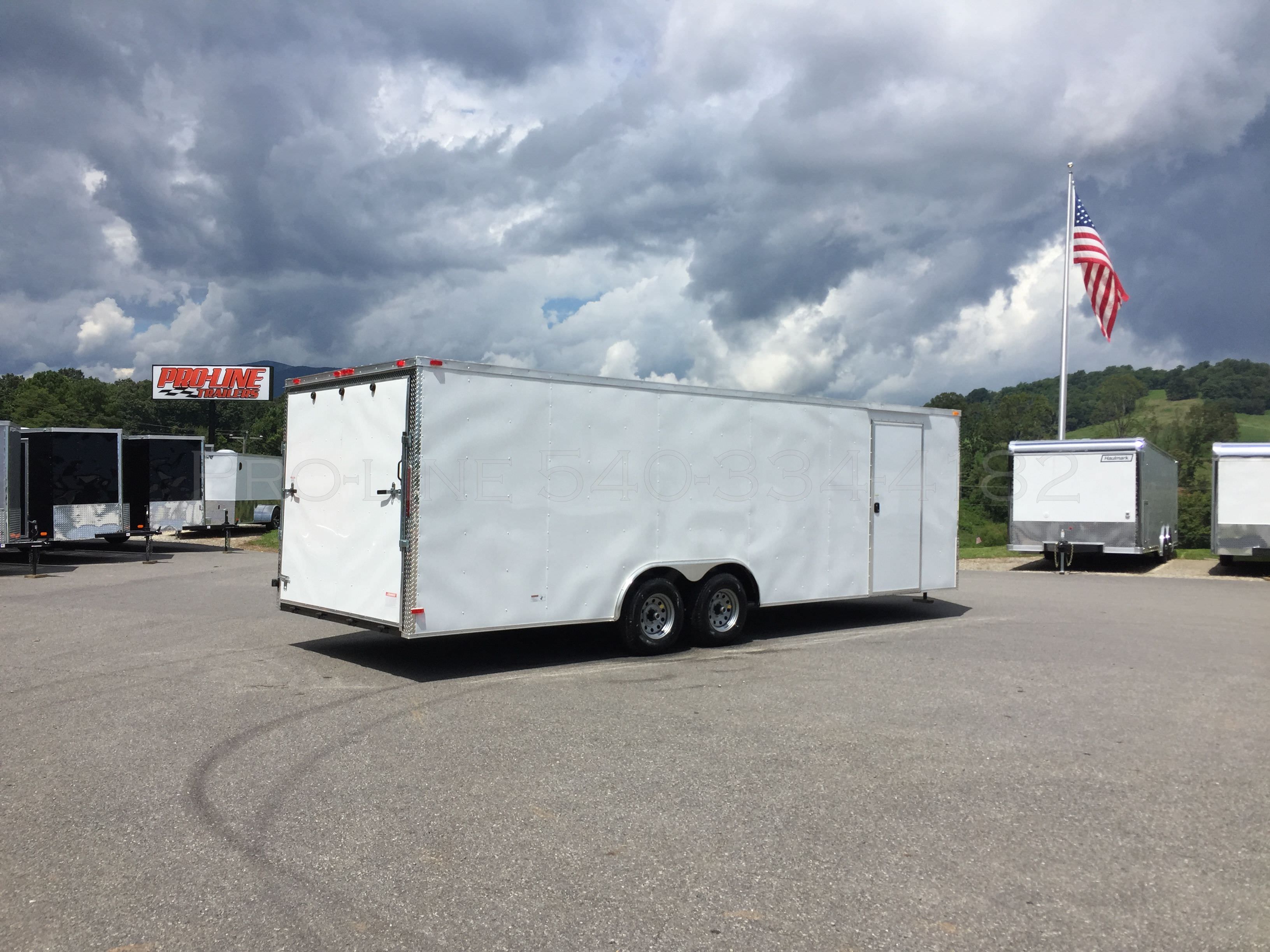
Think about the various ways you may use your trailer to help with your selected purchase.
Options to Consider
Are you going to need your trailer to haul a car? Maybe you need a flat bed for transporting lawn mowers for a landscaping business. Each trailer has options available to fit unique needs.
Here are some trailer options to consider:
- Do you need car doors or ramps for your trailer?
- Are you serving food in your trailer? Will you need electricity or gas connections?
- Do you need ventilation?
- Do you need awning style sides?
- Are you using your trailer to work inside as a work station?
- Will you be transporting liquids?
How Much Weight Will You Be Towing
A commonly overlooked aspect of trailer purchase is to consider how much weight will be carried. This is a very serious concern as it could not only place great strain on your towing vehicle, but put others on the road at risk.
A smart tip is to purchase a trailer with a payload capacity that exceeds the weight of the cargo you will be hauling. This will prevent damage to the trailer. Overloading a trailer’s axles can cause cracks to the frame and axles resulting in an unusable trailer.
Learn more about gross vehicle weight rating (GVWR or GVW): GVWR: Payload, Trailer Weight, & Why It Matters
Can Your Truck or Vehicle Easily Tow Your Trailer
Purchasing a trailer with a high payload capacity is great, but will your truck or SUV be capable of towing a fully loaded trailer? Many people overlook the capabilities of their tow vehicle. Smaller truck engines can be put under heavy strain and transmissions can burn out if the torque ratio is not sufficient.
Smaller vehicles may still be capable of towing with modifications. Transmission coolers can be added to reduce the strain on the transmission. Vehicles with small engines could be used for low weighted loads or for short-distance trips over low grades.
Towing Packages
Your truck may have a factory towing package installed. For those that do not, it is not recommended to tow a trailer attached to a bumper hitch. A solid steel frame tow package attached to the steel frame of a vehicle is most ideal.
Ball and Hitches
Not all hitches are rated the same. A weight value is associated to classify the total load that a hitch is rated for.
Hitch Weight Classes
Class I – Up to 2,000 lbs (Light loads)
Class II – Up to 3,500 lbs (Light loads)
Class III – Up to 5,000 lbs (Larger loads)
Class IV – Up to 10,000 lbs (Larger loads)
Above 10,000 lbs – Fifth Wheel or Gooseneck Hitch required for heavyduty loads. These hitches will allow up to 25,000 pounds.
Fifth Wheel and Gooseneck Hitches
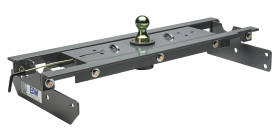 Gooseneck hitches are designed to attach to a ball and coupler within the bed of a pickup truck. This provides greater stability than a bumper pull style hitch.
Gooseneck hitches are designed to attach to a ball and coupler within the bed of a pickup truck. This provides greater stability than a bumper pull style hitch.
Fifth wheels are designed based on the same concept as semi-trailers. The fifth wheel uses a kingpin and pin receiver to connect via a hinged plate attached to the bed of a pickup truck.
Need help with hitch installation?
Schedule an appointment with the Pro-Line Trailers Service Team.
Braking Power
Not only does the vehicle need to be capable of towing, but stopping power is essential. Trailers carrying heavy loads take longer distances to stop, and the shifting of momentum from a weighted load makes stopping even more difficult. Add in transporting liquids, and the need to be able to brake quickly and safely becomes more of a necessity.
Some trailers are equipped with electronic braking systems that detect when you are applying pressure to the brake pedal. This, in turn, signals the brakes on the trailer to engage, helping to reduce the strain and wear on your vehicle, and safely bringing the entire package to a stop.
You’re Now Ready to Purchase Your New Trailer
After you have decided on the style of trailer you need, and the capabilities of your tow vehicle, you are ready to move forward! Purchasing your new trailer can be a great experience and provide excitement over the adventures you have on the road before you.
Let Pro-line Trailers help you find the right trailer for your budget and needs by giving us a call at (540) 334-4182 or by taking a look at our selection of trailers for sale.

